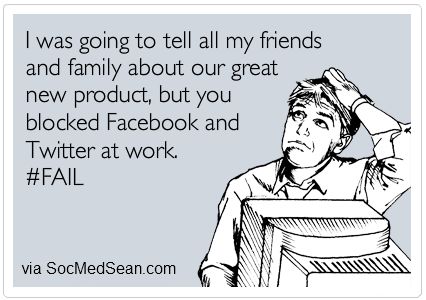
by Fronetics | May 4, 2015 | Blog, Marketing, Social Media, Talent
Here’s why your employees should use social media.
“Come here Mr. Watson, I want to see you.” Those were the words yelled by Alexander Graham Bell over the world’s first telephone connection. Bell had no way of knowing that a little more than fifty years later there would be more than 30 million telephones in use. To be sure, the telephone served as one of the greatest tools of business communication for over a century, but we are now in the midst of a new kind of technological revolution – one that puts social media directly in the spotlight.
The proliferation of social media has spilled into every facet of our daily lives, and the business implications are complex and far-reaching. Even though 74% of online adults are reported to use social media, a study commissioned by Robert Half Technology found that about half of companies block employees from using social media websites at work. Interestingly, 92% of companies indicated social media as a priority in a 2014 study by Social Media Examiner. With most companies managing all social media at the corporate level for functions like marketing and communications, businesses are missing an opportunity to empower employees to be strong brand advocates while making them more productive, more satisfied, and more connected. That’s why businesses should consider extending social media participation beyond their marketing departments.
Social media transforms communication into content, and vice versa. While email still remains a primary vehicle for the transmission of ideas and information for many workplaces, its very nature inhibits collaboration – it’s ideally used as a tool for private two-way communication. On the other hand, social tools capture ideas and conversations of employees and create a public database of employee-generated content. Openly sharing this content, which was previously hidden behind the privacy of email, fosters inclusion and creates a culture of connectedness.
Responding to a fundamental shift in buyer behavior, sales and marketing professionals are increasingly turning to social media to drive growth. No longer are buyers responding to interruption-based sales tactics; instead, they’re listening to online conversations, engaging with peers, and performing their own research to find solutions to their problems. Companies have taken note and in doing so have transformed the way buyers and sellers now connect. Underscoring the importance for companies to adapt to this new way of connecting to potential customers is HubSpot’s finding that 73% of sales professionals using social media outperformed their colleagues who were not on social media networking sites.
While social media has transformed marketing and sales functions, it’s rewritten the rules for human resource functions. Hiring managers now have public access to a wealth of professional and personal information about potential job candidates, making recruitment efforts more comprehensive than ever. Likewise, candidates are increasingly placing more value on soft compensation like social policies and work flexibility when considering employment offers. The parameters of work and personal life are becoming more and more blurred, and employees are finding companies that embrace their use of digital technology most attractive. Companies with rigid tech policies stand to lose out on top talent.
Social media is proving equally as powerful as a tool for employee retention. Employers that choose to ban social media risk alienating Millennials, a group for which oscillating between real life and the digital world comes naturally. Staying connected is so important to this group that a 2011 study by McCann Worldgroup found that 53% would give up their sense of smell rather than their phone or laptop. Considering the increasing number of businesses actively seeking to attract and retain employees from this generation, finding a way to incorporate and leverage social media would likely prove a much better strategy than blocking access altogether.
Businesses that permit – and even encourage – employee use of social media are able to innovate quicker by monitoring and engaging in the online conversations of customers and potential buyers. With over 58% of the entire U.S. adult population on social media, you can be sure there are conversations happening about brands whether or not they choose to participate in social media. Beyond just monitoring what’s being said about a company or brand, active participation in social media allows for nimble adjustments to marketing messages and potential new product development.
Of course, in order to derive value from employee participation on networks of social media, employers must thoughtfully consider the implications of providing access and set clear expectations for employees about its use (or misuse). Rather than arbitrarily opening access to social media, Cheryl Connor, business communications expert and author of Beyond PR: Communicate like a Champ in the Digital Age, recommends managers take a more thoughtful, structured approach. She suggests managers talk through the concept of open access to social media with employees. Knowing how employees feel about social media makes it easier to accommodate their needs. It’s true that unregulated workplace access to social media won’t work for every business or every employee, but companies that manage to find a way to integrate social media into functions where it makes sense will create value and drive profitable action.

by Fronetics | Apr 30, 2015 | Blog, Strategy, Supply Chain, Talent

Why “sexy” is a perfect fit for the supply chain.
Why do we apply the word “sexy” to things that are non-sexual, like, for example, the supply chain? Sexy is synonymous with the words exciting, appealing, fascinating, desirable, provocative. It’s a buzzword for something popular and attractive. When people think of the supply chain, do they think of the word “sexy”? Many might say no, but here’s an argument as to why it’s a perfect fit.
Are Apple products sexy? Are designer clothes sexy? Is the Audi A5 sexy? Are oysters sexy? Many people would answer yes. Substitute your favorite and most desired technology, clothes, cars, and food, and you will find that they are all products of the supply chain. Senior Vice President of Research at SCM World, Mark Davis, is leading the charge in pointing out the vibrancy, attractiveness, and desirability of the supply chain. A study conducted by SCM World shows how consumers view the supply chain. Here’s what they found:
- Very few people react to the supply chain in a negative or strongly negative way.
- People aged 16-25 view the supply chain as positive or strongly positive, which is more optimistic than any other age groups reported.
- People aged 56 and older reported the highest level of unfamiliarity with the supply chain, while people aged 16-25 reported being most familiar with the supply chain.
- People aged 16-25 were the least neutral compared to other ages in their reaction to the supply chain.
Given what we know about the Millennial generation, this makes sense, and it could be good news for the supply chain. Millennials are optimistic, achievement-oriented, social, collaborative, tech-savvy, and value-based. Their buying patterns are informing everything we do and it should be stressed that there are many of them. According to the New York Times, “there are more 23-year-olds — 4.7 million of them — than any other age, according to census data from June. The second most populous age group was 24, and the third was 22. There is no official age range for Millennials but the generation generally is defined as being born between the early 1980s and early 2000s. By 2020, they will account for one-third of the adult population.” We think of the Baby Boomer generation as the largest age group, but at 24% they are just surpassed by the Millennial generation at 26% of the population.
Often we equate what is sexy with youth. With the Millennial generation—our youth— poised to make up 50% of the workforce by 2020, the supply chain could harness their optimism and interest. According to Mark Davis, “we should all be highly optimistic about the future. Millennials are strongly positive about supply chain, which presents a unique opportunity for us to inspire them to choose it as a career. We have to keep them interested by sharing stories of how supply chain is innovating to solve the world’s three fundamental issues: health, hunger and environmental sustainability.”
Aside from being supported by Millennials, why else would we consider the supply chain “sexy”? Some of the most innovative work is being done in the supply chain, including enterprise resource planning, cloud-based computing, use of big data, and involvement in the Internet of Things. If the supply chain can continue to harness technology, make smart hires, and attract Millennials, the word “sexy” could apply for a long time.

by Fronetics | Apr 30, 2015 | Blog, Strategy, Supply Chain, Talent

Why “sexy” is a perfect fit for the supply chain.
Why do we apply the word “sexy” to things that are non-sexual, like, for example, the supply chain? Sexy is synonymous with the words exciting, appealing, fascinating, desirable, provocative. It’s a buzzword for something popular and attractive. When people think of the supply chain, do they think of the word “sexy”? Many might say no, but here’s an argument as to why it’s a perfect fit.
Are Apple products sexy? Are designer clothes sexy? Is the Audi A5 sexy? Are oysters sexy? Many people would answer yes. Substitute your favorite and most desired technology, clothes, cars, and food, and you will find that they are all products of the supply chain. Senior Vice President of Research at SCM World, Mark Davis, is leading the charge in pointing out the vibrancy, attractiveness, and desirability of the supply chain. A study conducted by SCM World shows how consumers view the supply chain. Here’s what they found:
- Very few people react to the supply chain in a negative or strongly negative way.
- People aged 16-25 view the supply chain as positive or strongly positive, which is more optimistic than any other age groups reported.
- People aged 56 and older reported the highest level of unfamiliarity with the supply chain, while people aged 16-25 reported being most familiar with the supply chain.
- People aged 16-25 were the least neutral compared to other ages in their reaction to the supply chain.
Given what we know about the Millennial generation, this makes sense, and it could be good news for the supply chain. Millennials are optimistic, achievement-oriented, social, collaborative, tech-savvy, and value-based. Their buying patterns are informing everything we do and it should be stressed that there are many of them. According to the New York Times, “there are more 23-year-olds — 4.7 million of them — than any other age, according to census data from June. The second most populous age group was 24, and the third was 22. There is no official age range for Millennials but the generation generally is defined as being born between the early 1980s and early 2000s. By 2020, they will account for one-third of the adult population.” We think of the Baby Boomer generation as the largest age group, but at 24% they are just surpassed by the Millennial generation at 26% of the population.
Often we equate what is sexy with youth. With the Millennial generation—our youth— poised to make up 50% of the workforce by 2020, the supply chain could harness their optimism and interest. According to Mark Davis, “we should all be highly optimistic about the future. Millennials are strongly positive about supply chain, which presents a unique opportunity for us to inspire them to choose it as a career. We have to keep them interested by sharing stories of how supply chain is innovating to solve the world’s three fundamental issues: health, hunger and environmental sustainability.”
Aside from being supported by Millennials, why else would we consider the supply chain “sexy”? Some of the most innovative work is being done in the supply chain, including enterprise resource planning, cloud-based computing, use of big data, and involvement in the Internet of Things. If the supply chain can continue to harness technology, make smart hires, and attract Millennials, the word “sexy” could apply for a long time.

by Fronetics | Apr 29, 2015 | Blog, Strategy, Talent

Every career coach will tell you that preparation is the key to interview success. Few ever talk about the key to interview failure. To understand how to succeed, you need to understand the ways you can fail.
Here’s your study guide to bombing your next interview.
Show up late
Hiring managers, like the rest of us, are short on time and likely have other appointments scheduled after yours. They tend to look favorably on candidates who show that they value their time. Most managers agree that arriving ten minutes early gives you sufficient time to check in with staff without becoming burdensome. When asked about appropriate interview arrival time, one manager flatly stated, “I won’t likely know if you’re early, but I’ll notice if you’re late.”
Dress inappropriately, and don’t even think about brushing your hair
In an online poll of HR professionals, personal hygiene and inappropriate dress stood out as the most egregious offenses of all job candidates. Describing his worst interview experience, an HR manager recounted a particular job candidate who chose to attend his interview shirtless – he didn’t get the job. You don’t have to wear a suit, especially if the company’s culture is informal, but you do need to wear a shirt. In fact, play it safe and stick to business casual attire for your interview.
Be on your worst behavior
Chewing gum, taking a phone call during the interview, or otherwise interrupting will hurt your chances at connecting with the hiring manager and all but obliterate your chances of securing the job. But small errors can quite literally cost you as well. Calling your interviewer by the wrong name or widely gesturing with your hands won’t make a good first impression. Make sure to get plenty of sleep the night before your interview, and prior to your arrival take some time to review your interview preparation materials and focus your thoughts.
Be Modest
While not necessarily a deal-breaker, you’re still missing an opportunity to sell the interviewer your best self. Sure, it may come as a little unnatural to present a total stranger your professional accomplishments and strengths, but if you don’t put those convincingly forward, you’re losing out on an opportunity to show how your experience and education make you the best candidate for the job.
Fail to show how you could contribute to the company
Up until your interview, the hiring manager has had a number of candidates give him the same thing – their resumes. The interview is your opportunity to set yourself apart by linking your relevant work experience with what you know about the company. The better you are at conveying your relevance and showing ways in which you could contribute to that company’s current goals and objectives, the better your chances will be of getting a job offer.
Bad-mouth former employers
Even if you feel slighted by your previous employer, it’s best to keep that information to yourself. If you’re asked to give details on your relationship with a previous employer, compose a frank response and keep it respectful. Most hiring managers can respect the fact that differences arise that may require someone to move on, but they won’t tolerate unprofessional behavior. Use the limited time you have in the interview room wisely by keeping the focus on why you feel you’d be a good fit for this position.
Be argumentative
If the hiring manager presses you for follow up details on an answer you gave, beyond actually just wanting more detail, that might be a signal that she’d like you to rephrase your answer or perhaps give a more relevant example to substantiate your point. Don’t view it as a personal attack. Keep your calm, take a deep breath, and rearticulate your answer in a new way.
Never show your appreciation
Whether it’s the hiring manager or the receptionist who scheduled your interview, do not miss a chance to tell them that you are grateful. Be respectful and show your courtesy by personally thanking the interviewer for inviting you in to discuss your potential contributions at her company. Sending a thank you email or handwritten letter after your interview gives you a chance to reemphasize your gratitude and remind the interviewer just what makes you the best candidate for the open position.
Following this guide to bombing your next job interview will undoubtedly lead you to failure. Without any preparation at all you’ll be sure to fail your next interview with flying colors. On the other hand, taking the appropriate measures to avoid these pitfalls will bolster your changes of career advancement and ensure you’ll never become a hiring manager’s “worst interview candidate”.

by Fronetics | Apr 29, 2015 | Blog, Strategy, Talent

Every career coach will tell you that preparation is the key to interview success. Few ever talk about the key to interview failure. To understand how to succeed, you need to understand the ways you can fail.
Here’s your study guide to bombing your next interview.
Show up late
Hiring managers, like the rest of us, are short on time and likely have other appointments scheduled after yours. They tend to look favorably on candidates who show that they value their time. Most managers agree that arriving ten minutes early gives you sufficient time to check in with staff without becoming burdensome. When asked about appropriate interview arrival time, one manager flatly stated, “I won’t likely know if you’re early, but I’ll notice if you’re late.”
Dress inappropriately, and don’t even think about brushing your hair
In an online poll of HR professionals, personal hygiene and inappropriate dress stood out as the most egregious offenses of all job candidates. Describing his worst interview experience, an HR manager recounted a particular job candidate who chose to attend his interview shirtless – he didn’t get the job. You don’t have to wear a suit, especially if the company’s culture is informal, but you do need to wear a shirt. In fact, play it safe and stick to business casual attire for your interview.
Be on your worst behavior
Chewing gum, taking a phone call during the interview, or otherwise interrupting will hurt your chances at connecting with the hiring manager and all but obliterate your chances of securing the job. But small errors can quite literally cost you as well. Calling your interviewer by the wrong name or widely gesturing with your hands won’t make a good first impression. Make sure to get plenty of sleep the night before your interview, and prior to your arrival take some time to review your interview preparation materials and focus your thoughts.
Be Modest
While not necessarily a deal-breaker, you’re still missing an opportunity to sell the interviewer your best self. Sure, it may come as a little unnatural to present a total stranger your professional accomplishments and strengths, but if you don’t put those convincingly forward, you’re losing out on an opportunity to show how your experience and education make you the best candidate for the job.
Fail to show how you could contribute to the company
Up until your interview, the hiring manager has had a number of candidates give him the same thing – their resumes. The interview is your opportunity to set yourself apart by linking your relevant work experience with what you know about the company. The better you are at conveying your relevance and showing ways in which you could contribute to that company’s current goals and objectives, the better your chances will be of getting a job offer.
Bad-mouth former employers
Even if you feel slighted by your previous employer, it’s best to keep that information to yourself. If you’re asked to give details on your relationship with a previous employer, compose a frank response and keep it respectful. Most hiring managers can respect the fact that differences arise that may require someone to move on, but they won’t tolerate unprofessional behavior. Use the limited time you have in the interview room wisely by keeping the focus on why you feel you’d be a good fit for this position.
Be argumentative
If the hiring manager presses you for follow up details on an answer you gave, beyond actually just wanting more detail, that might be a signal that she’d like you to rephrase your answer or perhaps give a more relevant example to substantiate your point. Don’t view it as a personal attack. Keep your calm, take a deep breath, and rearticulate your answer in a new way.
Never show your appreciation
Whether it’s the hiring manager or the receptionist who scheduled your interview, do not miss a chance to tell them that you are grateful. Be respectful and show your courtesy by personally thanking the interviewer for inviting you in to discuss your potential contributions at her company. Sending a thank you email or handwritten letter after your interview gives you a chance to reemphasize your gratitude and remind the interviewer just what makes you the best candidate for the open position.
Following this guide to bombing your next job interview will undoubtedly lead you to failure. Without any preparation at all you’ll be sure to fail your next interview with flying colors. On the other hand, taking the appropriate measures to avoid these pitfalls will bolster your changes of career advancement and ensure you’ll never become a hiring manager’s “worst interview candidate”.

by Fronetics | Apr 28, 2015 | Blog, Strategy, Talent

How to answer answer interview questions and ace your next interview.
Congratulations! You just landed a job interview. Your resume proved enough to get you in the door, but now the real work starts. How do you approach your interview preparation to ensure that on interview day you’ll be walking in cool, calm, and collected?
Start your preparation by reviewing our suggested approach to these common interview questions.
Can you tell me about yourself?
Despite this being one of the most frequently used interview questions (and often used as an opening question), this seems to be the one people find most difficult to prepare for. But if you’re successful in confidently articulating your fit for the position beyond what’s on your resume, you’ll set a favorable tone for the rest of the interview. Instead of reciting what has already been presented to your interviewer, use this time to share a little more detail. Is there a particularly relevant aspect of your previous position that you’d like to highlight? Now’s the time to mention it.
Why should I hire you?
Lucky for you, the hiring manager just pitched you a big, fat softball question. While initially intimidating to some, the “why should I hire you” question is really the best opportunity for you to start a dialogue with your interviewer about the things you feel make you most qualified for the position. For example, if the position requires someone that is customer service-oriented, you’ll want to include in your response not only your experience working with the public, but also an example that demonstrates how you handle unhappy customers.
What are your salary requirements?
While you likely have a specific number in mind based on your current lifestyle and income needs, it’s important to spend some time on sites like Glassdoor or Payscale to make sure your request is in line with what’s typical for your location and industry. Taking into consideration your education, experience, and skills, you’ll then be able to formulate an appropriate salary range. Most importantly, be flexible, but also firm with yourself and your interviewer during salary negotiations. If you feel the company’s offer is too low, don’t be afraid to cite relevant industry information to bolster your case for an offer increase. And by all means, no matter how badly you want the job, never agree to accept less than your minimum income requirements.
Why are you leaving your current job? Or, why did you leave your last job?
Regardless of the reason you’re seeking new employment, you’ll want to keep your answer to this question positive and keep the focus of the interview on your interest in the new position. Making negative comments about previous employers is a red flag that will cause hesitation for many hiring managers. Besides, you shouldn’t turn down an opportunity to convey your excitement about pursuing a new career, taking on new responsibilities, or expanding a specific skill set.
What are your greatest professional strengths/weaknesses?
When formulating an answer to these questions, remember that honesty is always the best policy. Never overreach and claim to be strong in an area you clearly aren’t just because you think it would help you land the position. Eventually, your dishonesty will be exposed and you might find yourself in hot water. To address the question of strengths, identify your forte in a functional area or highlight a strong character trait that’s most relevant to the position for which you are interviewing; be as specific as possible when giving examples on how you’ve demonstrated these in a professional environment. You’ll want to approach the question about your weaknesses a bit differently. While the hiring manager isn’t expecting you to come right out and say you’re terrible at something, she most assuredly isn’t looking for a declaration that you’re perfect. Offer your interviewer specifics about an area that you are working to improve. Don’t feel like your spreadsheet skills are up to par? Tell the interviewer about the classes you’re enrolled in at a local college. It’s expected that no one is perfect, but acknowledging an area where you have some room to grow, and actively working to advance your skills in that area shows self-awareness and initiative.
While there are some variables over which you won’t have control on the day of your interview, thinking through your answers to the most likely questions will improve your chances of presenting a strong and focused case for your candidacy.






